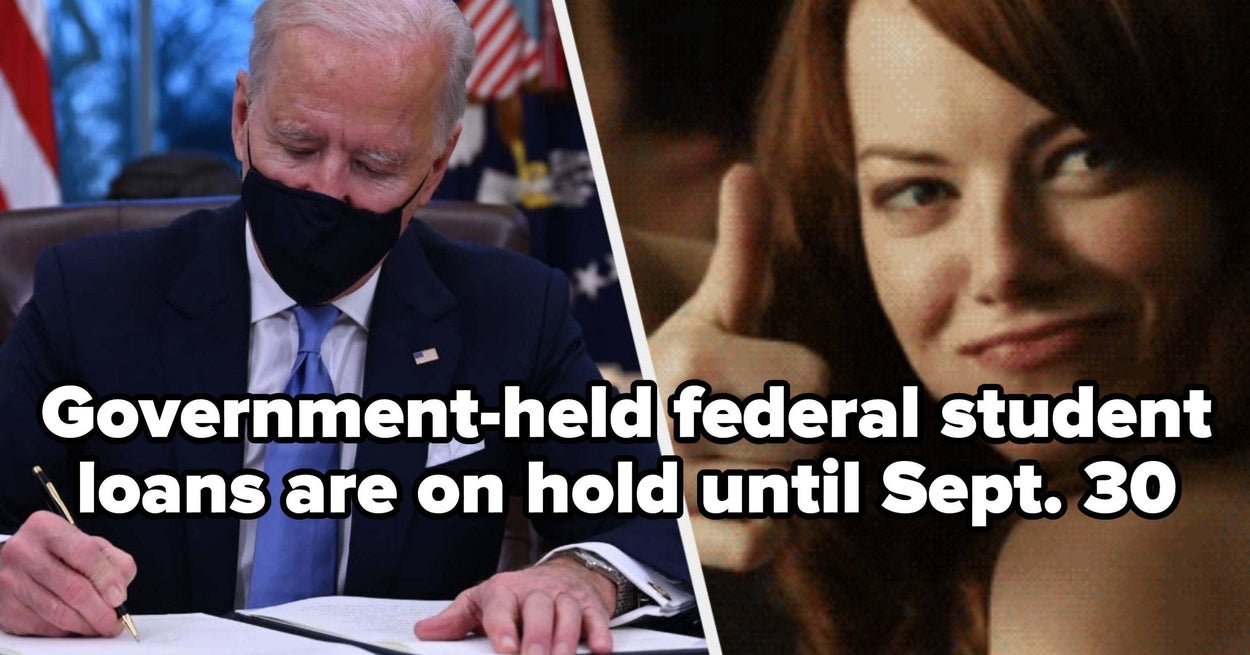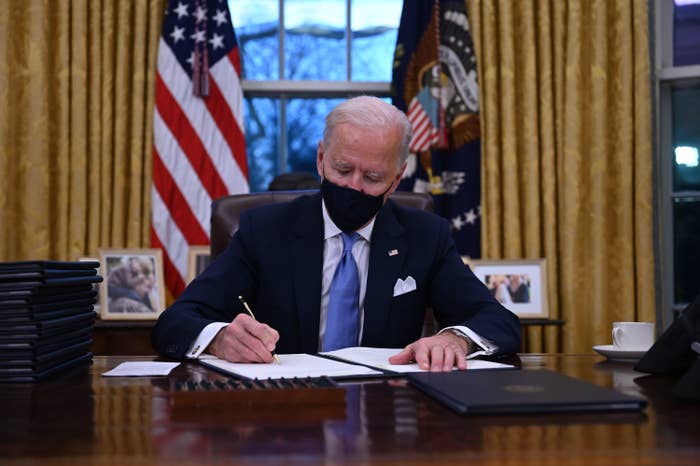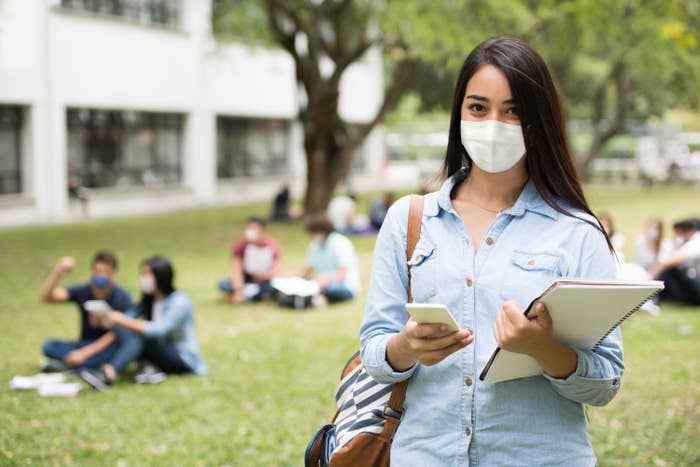
[ad_1]
In one of his first acts as president of the United States, Joe Biden asked the Department of Education to extend the student loan payment freeze that began waaaaaaaay back in March 2020 when the Coronavirus Aid, Relief, and Economic Security (CARES) Act passed.

Jim Watson / Getty Images / Via giphy.com
According to the Washington Post, 41 million Americans stand to benefit from this student loan payment freeze.
The student loan suspension was supposed to expire in less than two weeks, but now it’s set to last at least until Sept. 30, 2021.
CBC / Via giphy.com
This marks the third time that the federal student loan payment freeze has been extended. And depending on what happens next with the pandemic and the economy, it’s possible that the freeze could be extended again this fall.
Here are the answers to some common questions about the federal student loan freeze and how it might affect your payments:

Andresr / Getty Images
1.
Does this mean all student loans are on hold?
Amazon Prime / Via giphy.com
Only certain loans are on pause. Just like when the CARES Act originally paused student loans, this student loan freeze extension only applies to federal loans held by the Department of Education. So, if you’ve got private student loans, commercially held federal loans, or federal Perkins loans held by your school, unfortunately this freeze won’t apply to you. If you’re not quite sure what kind of loans you have, get in touch with your lender to find out.
If your loans don’t qualify for this program and you’re going through financial hardships, you can always reach out to your loan servicer to ask about your options for changing your payment plan or putting your loans into deferment or forbearance.
2.
What about interest? Will I end up owing even more when this is all over?
CBC / Via giphy.com
During the freeze, federal student loan payments are on hold and interest has been set to 0%. So you can rest easy knowing that your federal student loan debt isn’t growing.
Additionally, the freeze has paused collections on applicable federal student loans that were already in default before the pandemic. But be aware that when student loan payments resume, collections will too.
3.
What if I’m working toward Public Service Loan Forgiveness? Will the payment freeze cancel out my progress?
NBC / Via giphy.com
As it currently stands, borrowers need to make 120 consecutive payments to qualify for Public Service Loan Forgiveness. Luckily, taking advantage of the student loan freeze won’t send you back to square one if you’re on your way to forgiveness. Instead, as long as work requirements are met, suspended payments will continue to count toward your forgiveness goal.
However, reduced work hours could impact your status. According to the Department of Education, you will need to continue working at least 30 hours a week for a qualified employer during the freeze to keep your eligibility.
4.
Wait, I thought Biden was going to flat out forgive student loans?
HBO / Via giphy.com
While President Biden has said in the past that he supports forgiving $10,000 in federal student loans for all Americans, we’re not quite there yet. After all, this is only day two.
It’s definitely possible that more student loan relief or forgiveness is on the way, but it’s still too early to say for sure how or when it might get done.
5.
What do I need to do to take advantage of the payment freeze?
Fox / Via giphy.com
Literally nothing. If your loans qualify, any auto-payments you might have set up have been automatically put on hold and no interest will accrue.
But be wary of scammers who might try to take advantage of confusion during this period. If anyone contacts you asking you to pay a fee to qualify for the student loan freeze, don’t fall for it. Likewise, if someone asks for your personal information in order to freeze your loans, reach out to your loan servicer directly instead.
6.
Oops, I already sent a student loan payment for next month. Can I get a refund?
Nickelodeon / Via giphy.com
You sure can! In fact, according to the office of Federal Student Aid, you can contact your lender for a refund for any government-held federal loan payments you’ve made since March 13, 2020.
7.
I’m in school right now. Will this freeze help me with my loans?
NBC / Via giphy.com
Maybe. If you’re going to school on a direct, unsubsidized federal student loan, it would normally be accruing interest right now. However, thanks to the freeze, interest charges aren’t stacking up on unsubsidized, government-held loans at the moment. That means you might end up owing a little less than you expected when your loans come due.
8.
What if I want to make a couple of payments to get ahead on my loans?
Screen Gems / Via giphy.com
If you’re in a position to make payments on your loans, you totally can. Any payments you make during the freeze will first be applied toward interest or fees accrued before March 13, 2020. Then, once you’ve taken care of those charges, all your payments will go to the principal, which is just a fancy word for the actual amount of the loan you took out.
The fact your payments can make a bigger dent in your principal than usual during the freeze makes this a great time to keep making payments, if you can. Paying down principal now means you’ll likely pay less interest later.
If you want to make payments during the freeze, you have a couple of options. You can keep your loan in administrative forbearance, aka freeze mode, and contact your lender to make payments when you can. Note that you can even make partial payments that are smaller than your usual bill as long as your loan is paused. Or, you can tell your lender that you want to opt out of forbearance to get billed as usual.
9.
My federal student loans were in a grace period when the pandemic started. What happens when the freeze ends?
ABC / Via giphy.com
Many federal student loans include a six-month grace period that begins when you graduate, drop out, or dip below half-time enrollment in school. During the grace period, payments on your loans aren’t yet due. If your grace period was supposed to end during the suspension and you have a qualifying government-held loan, then your first payment won’t be due until after the student loan freeze ends.
10.
Will my monthly payments stay the same when the freeze is over?
NBC / Via giphy.com
It depends on your payment plan. For income-driven plans, if your income changes during the freeze period, then you can expect to see a different amount on your bill when it comes due again. If your income stayed the same, your payments will too.
And if you’re on a standard, graduated, or extended payment plan, your servicer will likely recalculate your monthly payments based on how much principal, interest, and time are left on your loans.
For any other questions that we didn’t cover here, Federal Student Aid has an incredibly thorough coronavirus FAQ — or you can always reach out to your lender directly to ask about your specific circumstances. And if you’ve got money on your mind, check out our other personal finance posts.
[ad_2]
Source link





